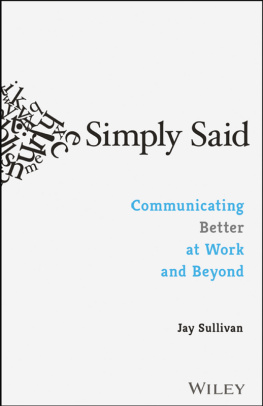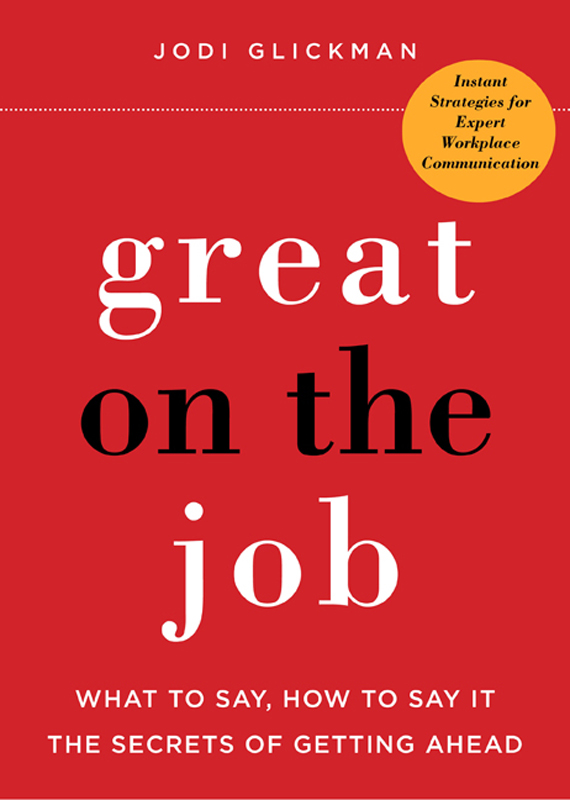
for my dad Richard S. Glickman
in loving memory of your brilliant mind, outsized heart & irreverent spirit.
i miss you.
Contents
Introduction
In 2009, Warren Buffett and Bill Gates addressed an audience of Columbia Business School students. Buffett was asked the one piece of advice hed give to new graduates. To much applause and laughter Buffet responded:
Right now, I would pay a hundred thousand dollars for ten percent of the future earnings of any of you. If thats true, youre a million-dollar asset right now. You could improve on that, many of you, and I certainly could have when I got out, just in terms of learning communication skills.
Its not something thats taught but if you improve your value fifty percent by having better communication skills, its another five hundred thousand dollars in terms of capital value. See me after the class and Ill pay you one hundred and fifty thousand.
Buffet hit the nail on the head: communication skills are important and theyre not taught. The vast majority of professionals rely on experiential learning when it comes to daily conversation and the critical skills and strategies necessary to make it on the job.
How many courses have you taken on how you talk with an employee youre firing? Or, how do you talk with the person who comes to your office late at night to tell you that her daughter is sick and she might not be able to come in the following day?
As managers and leaders of people, those are the kinds of questions that one deals with probably eighty percent of the time.
Eduardo Castro-Wright, Vice Chairman, Wal-Mart
How many of you have taken a formal course on how to ask for help? How about how to answer a question you dont know the answer to? How many of you have ever had anyone cover the topic of raising a red flag when a problem arises or how to effectively ask for feedback from your supervisor?
Giving effective feedbackthats covered ad nauseam. Public speaking, ditto. Interacting with a client? Thats covered too, but typically within the context of having a firm handshake, good eye contact, or displaying confidence. But how helpful is it when someone tells you to be confident or think outside the box? What does that mean and how do I implement it?
Traditionally, people either were good communicators, or not. They either had it, or they didnt. They connected with people and moved ahead, or didnt, and perhaps wondered why.
Moreover, when you had a workplace question, you typically asked a friend, colleague, spouse, or parent. The problem with this approach was twofold. First, there was limited perspective among those around youhow did you know that the friend, colleague, spouse, or parent you asked actually had a good answer? Second, the execution wasnt guaranteedwhos to say that even if and when you got good advice, you actually knew how to implement it?
Thats all about to change.
Communication is the only task you cannot delegate.
R OBERTO G OIZUETA , FORMER CEO, C OCA -C OLA
In 2008, I launched the consulting firm Great on the Job (GOTJ) to meet an unmet and, as of then, unidentified need in the marketplace: to teach people how to talk to one another at work, every day, in every situation, in all stages of their careers, whether they are on the top of their game or have no idea what the #$% is going on.
Great on the Job offers simple action strategies (usually 1-2-3step processes) and example language to give people the tools they need to communicate effectively, strategically, and persuasively on the joband to convey competence, confidence, and professionalism in all workplace encounters.
The Great on the Job methodology is proven, easy to implement, and doesnt require any homework. The roster of corporate and business-school clients whove hired Great on the Job to train their employees and students reads as a whos who of the best and the brightest: Harvard Business School, Wharton School, NYU Stern School of Business, Johnson School at Cornell, Kellogg School of Management, Citigroup, Bank of America/Merrill Lynch, and much of Wall Street. My clients couldnt be more satisfied. They find the skills Great on the Job teaches timely, urgent, and extremely impactful, and I consistently receive over 90 percent approval ratings for my presentations on workplace effectiveness.
Why Now?
People arent required to speak live anymore. They can send an e-mail, leave a voice mail, send a text or instant message, get their news via Twitter, and connect with friends on Facebook.
But business still isand will always bea personal thing. Dynamic and honed interpersonal skills are the keys to success in the workplace. Across industries, across professions, across the board from the rank and file to the executive suite, communication and relationship skills are key.
The art of live communication and relationship building remains critically important no matter what industry you work in. In todays global economy, its typically not the smartest, hardest-working, or most technically savvy who succeed. Even those who have complete mastery over the technical aspects of their jobs need to communicate and relate to others effectively and strategically to earn the respect, trust, and admiration of their colleaguesindeed, in order to succeed. The ability to communicate well is often the most important precursor to success in the workplace.
And while opportunities to engage in real one-on-one dialogue are dwindling, those we do engage in it become all the more important. With fewer opportunities to practice, an entire generation of young professionals is growing up rudderless in knowing how and when to speak. When they do speak up, the result is oftentimes horrifying.
Great on the Job gives readers foolproof strategies to:
Communicate effectively, strategically, and persuasively on the job
Convey competence, confidence, and professionalism in all workplace encounters
And so, there is Great on the Job. Having taught thousands of undergraduates and business-school students, Wall Street analysts and associates, and young professionals in nonprofits and corporate America how to communicate effectively and strategically, I am sharing my simple yet groundbreaking methods with you, the reader, in hopes of revolutionizing how we relate to, and interact with, one another in the workplace.
My goal is to make you a better communicator, a more productive employee, and a happier personbecause youll do better at your job and youll see positive results in all that you do.
How Does It Work?
Great on the Job is built on the premise that the art of communication can be translated into a science. Great on the Job uses micro-analysis to create a methodology that can be learned, practiced, and implemented immediately. There is a formula, a road map, a templatea tangible, practical guide that can get you from point A to point B in your next workplace conversation. Put another way, GOTJ takes a soft skill and turns it into a hard or technical skill.
Heres how GOTJ works: I take you through hundreds of conversations, soup to nuts, and give you the following:
1. Situational Analysis: Working America has many similarities across industries and across professions, in firms that provide services or produce products, and among employees who work for a CEO, Uncle Sam, or an executive director. People often work in teamseveryone has a boss, colleagues, superiors, or subordinates. You have deliverables, deadlines, and tasks at hand. Most of these situations can be examined collectively to give clues on how to handle them individually and effectively, no matter the specifics. In effect, Joe from accounting or Jane from marketing had a similar issue, and heres what happened.












